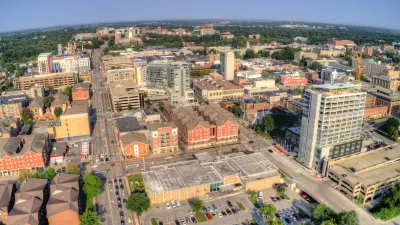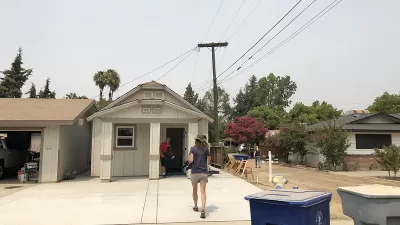With the cost of housing around Knoxville, Tennessee rising, elected officials and political candidates are looking for new ways to allow residential density.

Knoxville Mayor Mayor Indya Kincannon is expected to proposed zoning changes that would make it easier to build missing middle housing.
Silas Sloan reports that the mayor is focusing on residential density as the cost of housing around the Eastern Tennessee continues to rise.
“Kincannon told Knox News the proposed changes are based on a fall 2022 housing landscape study conducted by Opticos Design, a zoning reform consultancy hired by the city and Knoxville-Knox County Planning to identify solutions to the housing crunch,” writes Sloan.
Opticos Senior Associate Tony Perez is quoted in the article saying that vague and outdated language in Knoxville’s zoning code makes it difficult to develop missing middle housing.
“The proposed changes, created in partnership with East Tennessee Realtors, should be presented to the Knoxville City Council and Knoxville-Knox County Planning Commission this fall, Kincannon said, with a goal of finalizing the changes by January 2024,” reports Sloan.
Sloan also adds that R. Bentley Marlow, a developer who is running for the city's council's at-large seat B, has proposed another set of zoning changes that would allow missing middle housing a permitted development, or by-right development, in residential neighborhoods, rather than a special use.
Zoning reforms have been developing in Tennessee for a few years now as the state deals with swift growth and surging housing costs. Nashville reformed its parking requirements, setting parking maximums, in November 2022, for an example of a city achieving legislative reform prior to Knoxville’s explorations of missing middle housing.
FULL STORY: Knoxville's housing crisis could get help by easing path to build duplexes and townhomes [paywall]

Alabama: Trump Terminates Settlements for Black Communities Harmed By Raw Sewage
Trump deemed the landmark civil rights agreement “illegal DEI and environmental justice policy.”

Planetizen Federal Action Tracker
A weekly monitor of how Trump’s orders and actions are impacting planners and planning in America.

How Atlanta Built 7,000 Housing Units in 3 Years
The city’s comprehensive, neighborhood-focused housing strategy focuses on identifying properties and land that can be repurposed for housing and encouraging development in underserved neighborhoods.

In Both Crashes and Crime, Public Transportation is Far Safer than Driving
Contrary to popular assumptions, public transportation has far lower crash and crime rates than automobile travel. For safer communities, improve and encourage transit travel.

Report: Zoning Reforms Should Complement Nashville’s Ambitious Transit Plan
Without reform, restrictive zoning codes will limit the impact of the city’s planned transit expansion and could exclude some of the residents who depend on transit the most.

Judge Orders Release of Frozen IRA, IIJA Funding
The decision is a victory for environmental groups who charged that freezing funds for critical infrastructure and disaster response programs caused “real and irreparable harm” to communities.
Urban Design for Planners 1: Software Tools
This six-course series explores essential urban design concepts using open source software and equips planners with the tools they need to participate fully in the urban design process.
Planning for Universal Design
Learn the tools for implementing Universal Design in planning regulations.
Jessamine County Fiscal Court
Caltrans
Institute for Housing and Urban Development Studies (IHS)
City of Grandview
Harvard GSD Executive Education
Toledo-Lucas County Plan Commissions
Salt Lake City
NYU Wagner Graduate School of Public Service





























